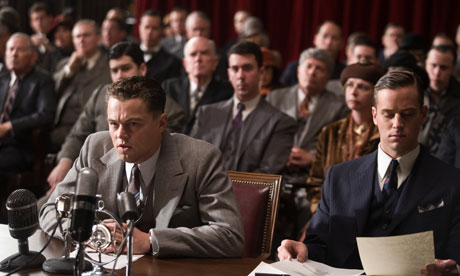J. Edgar – review
Clint Eastwood's biopic of J Edgar Hoover never gets to grips with the FBI founder's sexuality, or his impact on American life

Confused … Leonardo DiCaprio as J Edgar Hoover.
Recently, Hari Kunzru wrote about the approved products of culture that "taste of cardboard". Here is a film that tastes of latex and furniture polish. Working from a screenplay by Dustin Lance Black, Clint Eastwood directs this ponderous biopic of the legendary J Edgar Hoover, autocratically in charge of the FBI from 1935 until his death in 1972. Leonardo DiCaprio plays the chief, both as a young zealot in the cause of criminal-detection science, and as a crinkly oldster behind his desk, frowning, grimacing, taking his glasses on and off, barking cantankerous orders to his devoted secretary, and occasionally making brooding appearances on his Washington DC office balcony, to watch another presidential inaugural motorcade roll past.
- J Edgar
- Production year: 2011
- Country: USA
- Cert (UK): 15
- Runtime: 137 mins
- Directors: Clint Eastwood
- Cast: Armie Hammer, Dame Judi Dench, Ed Westwick, Josh Hamilton, Josh Lucas, Judi Dench, Lea Thompson, Leonardo DiCaprio, Naomi Watts
The drama happens largely in flashback as Hoover dictates his life story to a succession of submissive junior agents. He says he wants to "reclarify the difference between villain and hero". There are some foggy reclarification processes at work in this movie, which refrains from simply denouncing Hoover's attitude to civil liberties, balancing this topic with Hoover's dynamic G-Man attacks on gangsters and terrorists, and with his proto-CSI innovations. Young Hoover proposes marriage to the pretty typist Helen Gandy – another uninteresting role for Naomi Watts – and, on being gently rebuffed, appoints her instead his trusted assistant and keeper of the confidential files that were to make him feared throughout Washington.
But Eastwood and Black put at the centre of this film Hoover's quasi-homosexual, buttoned-up platonic relationship with his Bureau deputy, Clyde Tolson, played by Armie Hammer. The two men, and Gandy, periodically shuffle on for later-life appearances, prosthetically and somewhat exotically aged up.
The movie does not quite reclaim Hoover for gay history, neither does it exactly claim a tragic status for Hoover's imprisonment in the closet, nor quite suggest that his tentacular empire was a symptom of sexual repression. There is a weird, muffled neutrality to all this, a lot of pulled punches and fudged issues, as if screenwriter and director have made an uneasy alliance to create a Hoover they admire from different angles: the fictional love child of Harvey Milk and Dirty Harry. And there's an infuriating final twist that sneakily preserves the movie's impartiality.
What is crystal clear is that this Hoover is dominated by his mother, played by Judi Dench, and it is in relation to her that Eastwood and Black effectively acknowledge the scurrilous apocryphal anecdote about Hoover cross-dressing, though in respectfully rewritten form. This film's echoes of Hitchcock's Psycho are striking, almost as if America is turning into a huge Bates motel with peepholes. But are these echoes intentional?
DiCaprio's Hoover is an interesting and considered performance, and he and Eastwood plausibly put us inside Hoover's home life. DiCaprio is most convincing when he shows J Edgar as a young man, with an almost obsessive interest in library systems of classification, his dark eyes lighting up with excitement at the thought of applying these systems to putting the entire population under surveillance. Here is no action man, but an administrator and super-nerd, with a intensely developed sense of professionalism and – something to appal Tea Party activists – an enthusiast for big government and federal empire, sweeping aside the rickety local police departments and putting in place a nationwide outfit of souped-up crimebusters, armed to the teeth.
As he grows older, Hoover worries about putting on weight, but DiCaprio shows how he is pleased to hear both his mother and his doctor call it "solid weight". I'm not sure quite how solid it is. The younger, slighter Hoover is more substantial, examining his men like a general making a military inspection, and not hesitating to fire those agents who have loud suits, facial hair and who neglect to call him sir. Skittishly overexcited at the job application from handsome young Clyde Tolson, he David Brent-ishly works out in his office, doing pressups. Yet with his plastic old-guy face on, this Hoover seems to me lacking in form and interest. DiCaprio has an odd habit of neurotically wiping his palms after shaking hands, a mannerism that looks left over from his performance as Howard Hughes.
The truly sensational scene is also somehow one that still preserves the film's distance from Hoover's emotional life. On vacation with Tolson (they enjoy going to the races together), he nervously confides that he is thinking of getting married to Dorothy Lamour, of all the outrageously obvious beards. With superhuman restraint, Black does not put in any gags about how long Hoover has been, ahem, a friend of Ms Lamour. Tolson explodes with jealousy, rage and hurt. There is no doubt about how he feels – and yet even here, at the epicentre of this emotional meltdown, Eastwood preserves the glimmer of a possibility that Hoover, though the recipient of homosexual love, is himself merely asexual, confused, with sentimental, brotherly feelings. The final scenes are syrupy and faintly bizarre, like a gay Muppet opera about the leave-taking of Statler and Waldorf.
There are interesting moments and interesting scenes here – but this J Edgar becomes a sonorous, History Channel drone. The effect of Hoover on America itself is largely ignored, its speculations are cramped, and its actors hampered with plastic, padding and wigs.



Nenhum comentário:
Postar um comentário